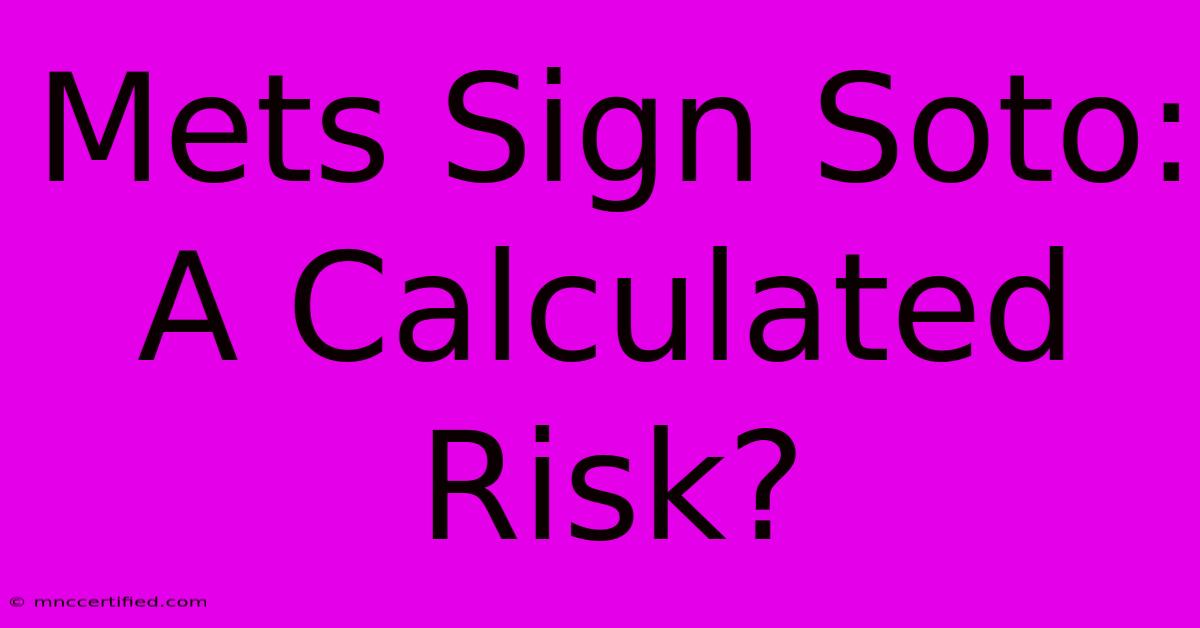Mets Sign Soto: A Calculated Risk?

Table of Contents
Mets Sign Soto: A Calculated Risk?
The New York Mets' recent acquisition of superstar Juan Soto has sent shockwaves through Major League Baseball. While the move undeniably boosts their offensive firepower, the question remains: was signing Soto a shrewd strategic play or a potentially crippling gamble? This article delves into the complexities of the deal, analyzing the potential benefits and drawbacks for the Mets.
The Allure of Soto: A Game-Changer?
Juan Soto is, without a doubt, one of baseball's most prodigious talents. His batting average, on-base percentage, and slugging percentage consistently rank among the league's elite. His presence in the Mets' lineup instantly elevates their offensive potential, providing a formidable threat capable of changing the course of any game. This addition significantly increases their World Series odds, making them a stronger contender in a highly competitive NL East. The impact extends beyond just numbers; Soto's presence brings a level of star power and media attention that can benefit the entire franchise.
On-Field Impact: Immediate and Long-Term
The immediate impact on the Mets' offense is undeniable. Soto's ability to get on base, combined with the power hitting of players like Pete Alonso, creates a potent lineup capable of scoring runs in bunches. This offensive surge could be the difference between a playoff berth and a disappointing season. Long-term, the Mets are hoping Soto becomes a cornerstone of their franchise for years to come, cementing their status as a perennial playoff contender. However, this hinges on Soto's continued performance and his ability to adapt to the pressures of playing in New York.
The Price Tag: A Heavy Investment
Acquiring a player of Soto's caliber comes at a significant cost. The Mets committed to a lucrative long-term contract, a hefty investment that carries considerable financial risk. This substantial expenditure necessitates careful financial management and could impact the team's ability to address other areas of need in the future. The contract's length and financial implications are crucial factors in evaluating whether the Mets' gamble paid off.
Financial Implications and Roster Constraints
The financial burden of Soto's contract could restrict the Mets' flexibility in the future free agency market. This limits their ability to address potential weaknesses in other areas of the team, such as pitching or defense. The organization must strike a delicate balance between investing in their star players and maintaining a financially sustainable model. The long-term financial sustainability of this deal will be a key factor in assessing its ultimate success.
The Risk-Reward Analysis: A Calculated Gamble?
Ultimately, the Mets' signing of Juan Soto represents a calculated risk. The potential rewards – a significant boost in offensive prowess, increased playoff chances, and enhanced media appeal – are substantial. However, the financial implications and the uncertainties inherent in any long-term contract cannot be ignored.
Weighing the Odds: Success and Failure Scenarios
The success of this move hinges on several factors, including Soto's performance, the team's overall chemistry, and the Mets' ability to manage their resources effectively. A successful scenario sees Soto thriving in New York, leading the Mets to deep playoff runs and justifying the substantial investment. Conversely, a failure scenario could involve Soto underperforming, contract regret, and a potential strain on team finances.
Conclusion: Time Will Tell
Only time will reveal whether the Mets' gamble on Juan Soto pays off. While the short-term benefits seem significant, the long-term consequences remain uncertain. The team's success hinges on a multitude of factors, and the effectiveness of this high-stakes move will be debated for years to come. This acquisition underscores the inherent risks and rewards in the unpredictable world of professional sports. The impact of the Soto signing will be a recurring theme in baseball discussions for the foreseeable future.

Thank you for visiting our website wich cover about Mets Sign Soto: A Calculated Risk?. We hope the information provided has been useful to you. Feel free to contact us if you have any questions or need further assistance. See you next time and dont miss to bookmark.
Featured Posts
-
Sora Released Open Ais New Video Model
Dec 10, 2024
-
West Ham V Wolves Live Match Updates
Dec 10, 2024
-
Car Insurance Pearland Tx
Dec 10, 2024
-
West Ham Vs Wolves Streaming Info
Dec 10, 2024
-
Julie Stevens Play School Star Dies
Dec 10, 2024